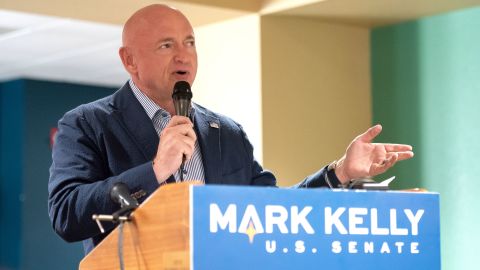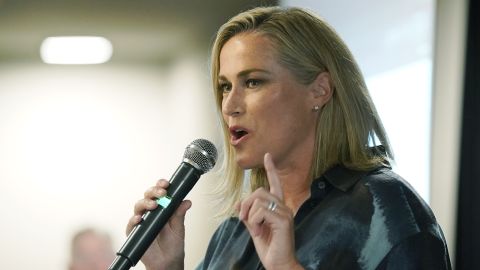[ad_1]
CNN
—
Seven Democrats in the 10 most competitive Senate races started this month and the home stretch to Election Day with bigger cash stockpiles than their Republican rivals, newly filed campaign finance reports show.
But even with that financial edge, Democrats face a withering advertising assault in the final weeks of the campaign from deep-pocketed outside groups.
The stakes are enormous for both political parties: Control of the Senate – along with the ability to shape federal policy for the remainder of President Joe Biden’s first term – hinges on the results in just a handful of states.
The Senate Leadership Fund, a super PAC aligned with Senate Minority Leader Mitch McConnell, led GOP outside groups in fundraising, taking in $111 million during the three-month period ending September 30, the new filings show. That figure rivaled its haul during the first 18 months of this election cycle as some of the GOP’s biggest donors stepped up their giving.
“SLF is steadily closing the gap in the fight to retake the Senate majority, and our donors are fired up about slamming the brakes on Joe Biden’s disastrous left-wing agenda,” group president Steve Law said in a statement.
In all, the fund has spent more than $200 million on advertising this cycle, including ads that have already aired and reservations booked for the final weeks of the election, according to a CNN review of data compiled by AdImpact.
The McConnell-aligned group “has really been a life raft for Republican Senate candidates across the board that have struggled to fundraise in any great amount,” said Jacob Rubashkin, an analyst with the nonpartisan political handicapper Inside Elections with Nathan L. Gonzales. “What we see in state after state after state is the advertising burden being borne by SLF and outside groups.”
Here are more takeaways from the third-quarter fundraising reports filed with the Federal Election Commission:
The reports, which were due Saturday night, show individual Democratic Senate contenders outraising their Republican rivals in a slew of competitive races – including marquee contests in Georgia, Arizona, Pennsylvania and Wisconsin.
Democrats in all four of those states – Sens. Raphael Warnock of Georgia and Mark Kelly of Arizona; John Fetterman of Pennsylvania; and Mandela Barnes of Wisconsin – each collected more than $20 million during the quarter. That was a milestone no Republican Senate hopeful in a competitive race was able to match.
Warnock, Kelly and Fetterman all ended September with more cash on hand than their GOP opponents. Four other states on CNN’s most recent list of the 10 Senate seats most likely to flip also saw the Democratic nominees finish with a bigger bank balance on September 30: Sens. Catherine Cortez Masto of Nevada, Michael Bennet of Colorado and Maggie Hassan of New Hampshire, and North Carolina hopeful Cheri Beasley.
Warnock, in pursuit of a full six-year term after winning a special election last year, brought in $26.4 million during the June-to-September fundraising period, to lead all Senate candidate fundraising. His haul is more than double the nearly $11.7 million raised by his Republican rival, Herschel Walker.
Those figures, however, don’t reflect fundraising since a recent spate of developments in the Georgia contest – including a contentious debate Friday night in Savannah.
National Republicans have rallied to Walker’s side in recent weeks, following news reports that the Republican paid for a woman’s abortion in 2009 and then asked her to terminate a second pregnancy two years later.
Walker, who said in May that he supported a full ban on abortions, with no exceptions, has called the allegations “a lie.” CNN has not independently confirmed the woman’s allegations.
In a statement, Walker’s aides said the campaign bought in more than $450,000 online in a single day recently – as prominent Republicans, including Florida Sen. Rick Scott, who helms the Senate GOP campaign arm – joined him on the stump in an effort to quell the controversy.

Although Warnock has used his sizable war chest to hammer Walker on the airwaves, a CNN review of advertising buys from October 1 through Election Day tracked by AdImpact shows outside groups, led by the Senate Leadership Fund, dominating the advertising in the Peach State.
SLF’s advertising tops the list at $25.2 million with Georgia Honor, a Democratic super PAC, in second place at just shy of $21.7 million.
Top donors to the Senate Leadership Fund during the third quarter included some of the biggest financial backers in Republican politics. Leading the list at $10 million apiece were three billionaires: Miriam Adelson, a physician and widow of the late casino magnate Sheldon Adelson; Ken Griffin, founder of the Citadel hedge fund; and Blackstone CEO Stephen Schwarzman. The Senate Leadership Fund’s haul also included $20 million from its nonprofit arm, One Nation, which does not disclose its donors’ identities.
SLF entered October sitting atop $85.2 million in cash reserves.
(The Senate Majority PAC, the leading super PAC working to elect Democrats to the chamber, is slated to file a report detailing its most recent fundraising later this week. The group reported more than $65.7 million remaining in the bank at the end of August.)

Kelly, the Democratic incumbent in Arizona, raised $23 million in the June-to-September window, more than four times the contributions collected by his Republican challenger, Blake Masters, the new filings show.
And Kelly, who is seeking a full six-year term, started October with more than $13 million remaining in the bank – far surpassing the $2.8 million available to Masters.
National Republican leaders have exhorted billionaire investor Peter Thiel to put more money into the Arizona race to rescue Masters, his former employee. (An initial $15 million Thiel sent to a pro-Masters super PAC, Saving Arizona, helped the first-time candidate survive a competitive primary earlier this year.)
Saturday’s filings show Saving Arizona raised a little more than $4.4 million during the third quarter with no additional investment during that period from Thiel.
Among the biggest donors in the three-month period: Shipping and packaging magnate Richard Uihlein, who gave $3 million. And Cameron and Tyler Winklevoss, the billionaire twin investors perhaps best known for their legal battle with Mark Zuckerberg over who invented Facebook, donated $500,000 apiece to the super PAC last month.

A notable exception to Democrats’ fundraising dominance: Washington state, where first-time candidate Republican Tiffany Smiley raised $6 million to surpass the $3.6 million brought in by five-term Sen. Patty Murray during the three-month period.
National Republican groups have not invested so far in trying to topple Murray, the No. 3 Senate Democrat, in this traditionally blue state. (Inside Elections rates the contest as Likely Democratic.)
But Smiley’s late-breaking fundraising success has put a spotlight on the 39-year-old former triage nurse, who is waging her first political campaign.
Murray entered October with the larger stockpile of available cash – roughly $3.8 million to Smiley’s nearly $2.5 million.
Meanwhile, in Ohio – a former bellwether state that has swung to Republicans in recent cycles – Democratic Rep. Tim Ryan raised a substantial $17.2 million, with Republican J.D. Vance lagging far behind in their closer-than-expected contest.
Ryan, who has plowed millions of his campaign dollars into advertising, started October with just $1.4 million remaining in the bank to Vance’s nearly $3.4 million. Ryan, a 10-term congressman, has implored national Democratic organizations to help, but they have prioritized other top-tier contests in states such as Pennsylvania, Georgia, Nevada and North Carolina.
SLF and, more recently, a super PAC aligned with former President Donald Trump, have hit the airwaves on Vance’s behalf in an effort to keep this open Senate seat in the Republican column.
The current officeholder, GOP Sen. Rob Portman, is retiring.
In the 19 House races that Inside Elections currently rates as Toss-ups, the Democratic nominees outraised their GOP opponents during the third quarter, the weekend filings show. And a dozen entered October with more cash in the bank than their Republican rivals.
In one of the mostly closely watched contests, Alaska’s newly minted congresswoman, Democratic Rep. Mary Peltola, collected nearly $4 million during the quarter – including $2.3 million raised after she won an August special election to fill the remainder of the late GOP Rep. Don Young’s term.
Peltola is on the ballot again in November as she seeks a full, two-year term for the state’s lone House seat, and she started October with more than $2.2 million in available cash. That far exceeds the cash balances of her Republican rivals, Nick Begich and former Gov. Sarah Palin.
Begich reported more than $547,000 in available cash and Palin, the 2008 GOP vice presidential nominee, had nearly $195,000.
The three, along with a Libertarian candidate, will face off next month in a general election that will be decided by the state’s new ranked-choice voting system.
As in Senate contests, Republican outside groups have been major players in the battle to flip the House.
The Congressional Leadership Fund, the main super PAC focused on GOP efforts to recapture the House majority, recently announced that the group and its nonprofit arm had raised a combined $73 million in the third quarter, bringing its cycle total to $220 million.
It has spent nearly $160 million on advertising, including future reservations for the final weeks of the campaign.
Trump is not on the ballot this year, but he’s been among the GOP’s most active online fundraisers – blasting out emails and text messages seeking money from his legions of small-dollar donors.
His joint fundraising committee collected $24.1 million during the third quarter, a roughly 41% jump over the previous three-month period, according to its new report with campaign finance regulators. The former President had pressed supporters with requests for donations following the FBI search of his Mar-a-Lago resort in Florida in August.
But Trump’s Save America Joint Fundraising Committee spent nearly as much as it raised, pouring more than $21.7 million into total operating expenses during the quarter.
This story has been updated with additional third-quarter fundraising information.
[ad_2]
